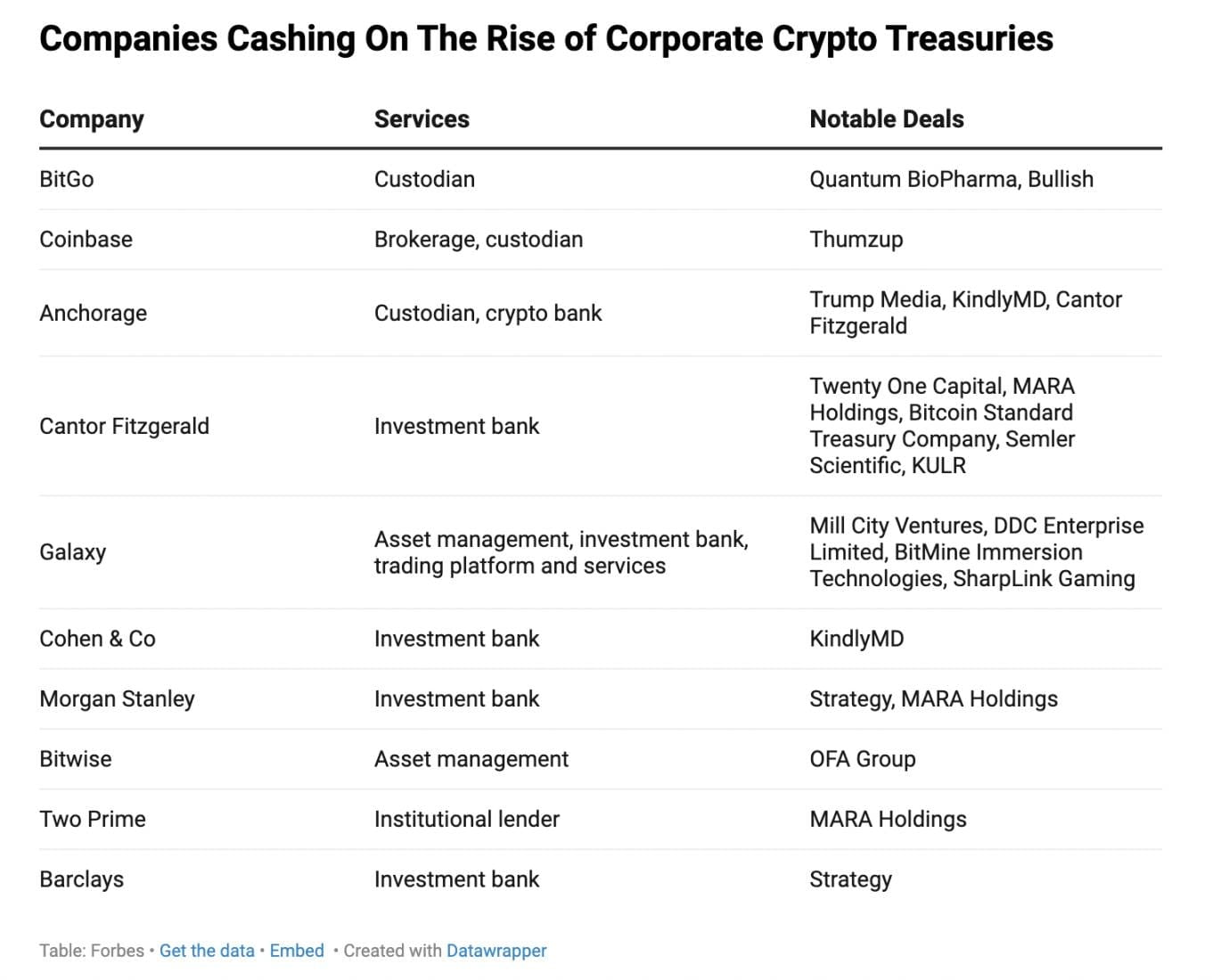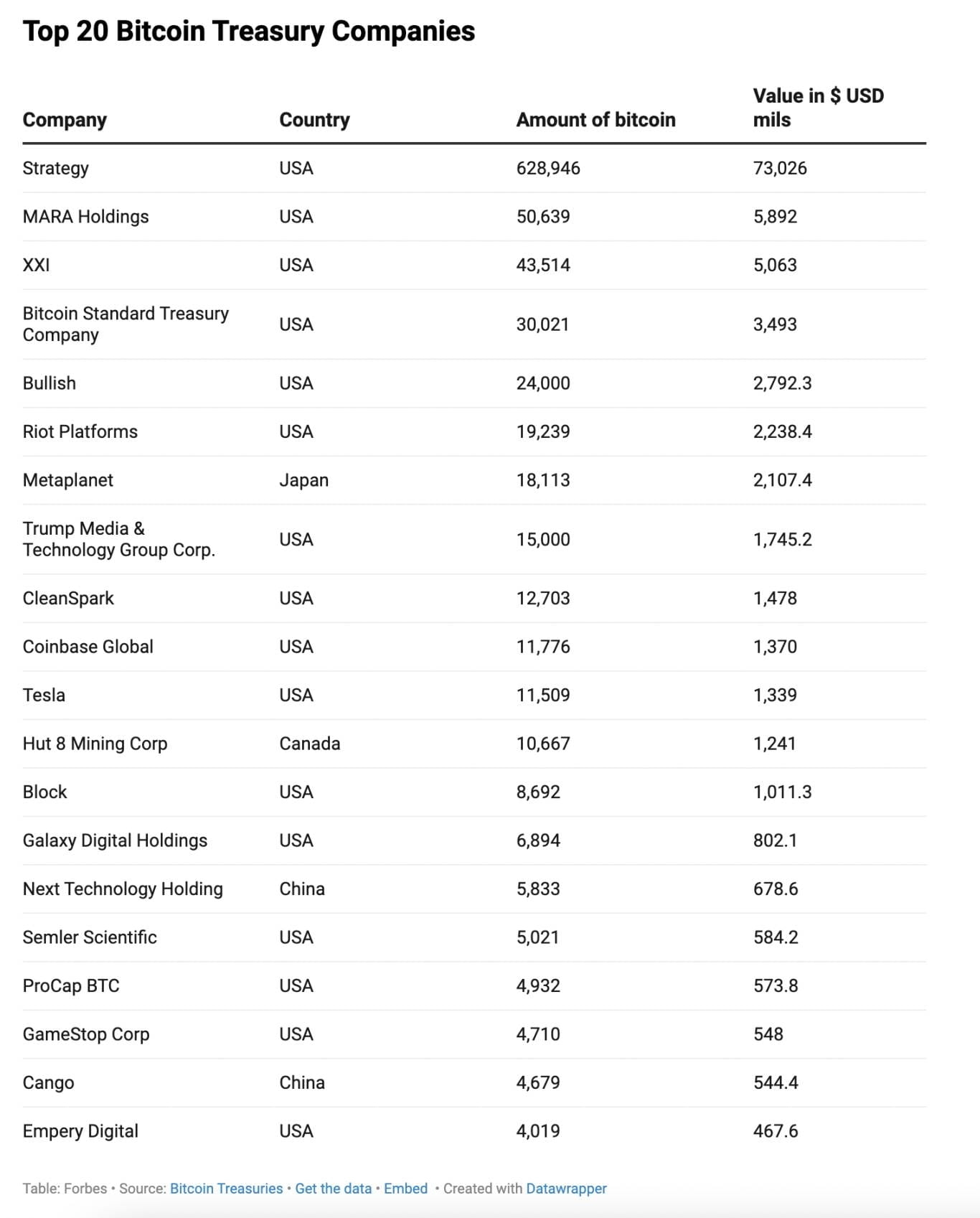Written by: Julie Goldenberg, Forbes
Translated by: Luffy, Foresight News
Today, the number of publicly traded companies incorporating cryptocurrency into their balance sheets has reached a record. Ostensibly, they do this to diversify their portfolios, hedge against inflation, and attract new investors; of course, the unspoken reason is that management hopes to boost stock prices. In recent months, merely announcing so-called "cryptocurrency treasury" strategies has been enough to give the company's stock price a premium.
However, the real wealth feast is flowing to the "toolmakers" in this latest "gold rush": custodians, brokers, asset management firms, and investment banks that charge fees for every transaction, transfer, and storage service.
Nathan McCauley, co-founder and CEO of Anchorage Digital based in San Francisco, stated that this trend has reached a "frenzy level" over the past six months, and has created a "contagion effect." This crypto bank has completed several transactions: managing a $2 billion bitcoin treasury for Trump Media Group and a $760 million asset custody for Nakamoto Holdings. Nakamoto Holdings is a bitcoin-focused company that recently announced a merger with KindlyMD via a special purpose acquisition company (SPAC). KindlyMD is a small medical company based in Salt Lake City that has been losing money, and its stock price had been below $2 for a long time before the merger announcement in May; now, Nakamoto Holdings, honoring bitcoin's anonymous founder Satoshi Nakamoto, has been listed on NASDAQ (stock code: NAKA) with a stock price of $15 and a market capitalization of $114 million.
According to Bitcoin Treasuries.net data, a year ago, a handful of corporate buyers held just over 416,000 bitcoins combined; now, at least 152 publicly traded companies hold over 950,000 bitcoins, worth more than $110 billion. The undisputed "whale" remains Strategy, owned by billionaire Michael Saylor. The company pioneered the corporate cryptocurrency treasury model, largely utilizing innovative financing methods such as convertible bonds and floating-rate perpetual preferred shares. Strategy Inc. originated from a small software company named MicroStrategy in Tysons Corner, Virginia, which now holds $73 billion worth of bitcoin, with a market capitalization of $95 billion, a 25% premium over its crypto asset holdings.
And companies emulating Strategy are not just focused on Bitcoin; they are also buying Ethereum, Solana, and a host of other crypto assets. According to data from Palo Alto crypto consulting firm Architect Partners, companies have raised over $98 billion for such investments just this year; since June, another 139 companies have committed to invest $59 billion. The latest case is: the cryptocurrency company World Liberty Financial, controlled by the Trump family, recently announced the establishment of a $1.5 billion treasury centered around its own token WLFI—this does not include the $2 billion bitcoin treasury of Trump Media Group.

Companies profiting from the rise of corporate cryptocurrency treasuries
Elliot Chun of Architect Partners stated that since this trend is still in its early stages, its overall impact is difficult to quantify, but the boom has already "fully generated huge fee income."
For many traditional investment banks and brokerage firms like Morgan Stanley, Barclays Capital, Moelis & Company, and TD Securities, the underwriting commissions and other fees from preferred stock and convertible bond issuances have become a profitable business.
Take Strategy's issuance of 8.5 million preferred shares and raising $722 million in March this year as an example. Morgan Stanley and about 12 other institutions acted as underwriters, reportedly earning $10 million in fees. Florida-based cryptocurrency mining company MARA Holdings issued $950 million in convertible bonds in July, and institutions like Morgan Stanley may profit $10 million from this deal.
Another group benefiting from the cryptocurrency treasury craze is the "qualified custodians"—they safeguard digital assets for clients. Taking Palo Alto's established company BitGo as an example, thanks to the booming crypto market and the expansion of corporate treasuries, its custody assets are expected to exceed $100 billion in the first half of 2025.
"(The corporate treasury business) is increasingly becoming a larger part of our business. Six months ago, there were not many such businesses, but now they account for a significant portion of new clients," said Adam Sporn, head of BitGoPrime brokerage and U.S. institutional sales. He estimates that around 24 cryptocurrency treasury-related companies have announced partnerships with BitGo for custody services in just the past few months. The surge in business has also paved the way for BitGo to secretly submit an IPO application in July.

Top 20 Bitcoin treasury companies
Major custodians like BitGo and Coinbase charge institutional clients fees that include setup fees, annual fees, and additional fees, which are linked to the custody of crypto assets and services that help clients earn returns. Ravi Doshi, co-head of global markets at FalconX, stated that the most common fee structure is an annual fee based on the size of custody assets, usually ranging from 0.15% to 0.30%, but large clients can negotiate it down to 0.10%.
Although these fees translate to hundreds of millions of dollars in revenue for custodians managing tens of billions of bitcoin, the profits from custody transactions are often thin. Dan Dolev, a senior fintech analyst at Mizuho Securities, pointed out that the cryptocurrency demand generated by these "agents" has also brought additional revenue to exchanges and brokers such as Coinbase, FalconX, and Cumberland: buying drives up prices, attracts new investors, and promotes more token trading, creating a cycle.
In addition to trading and custody, services like staking, lending, and options coverage are also another lucrative area. Staking refers to users locking tokens to help validate blockchain transactions and earn rewards; options strategies adjust the risk-return profile of an investment portfolio using financial derivatives without changing the underlying asset allocation.
"Once these companies raise funds and incorporate them into their balance sheets, they will soon face the question of 'what's next.'" Chun of Architect Partners stated, "Over $60 billion in crypto assets needs to generate returns, which these publicly traded companies cannot achieve on their own." Sidney Powell, CEO of Melbourne-based crypto lending company Maple Finance, pointed out that companies currently still rely on the appreciation of underlying assets to generate returns, but the rapid spread of the cryptocurrency treasury trend will force companies to differentiate themselves by seeking yield strategies or low-cost funding to buy bitcoins.
Juan Leon, senior investment strategist at crypto asset management and consulting firm Bitwise, stated that to build competitive advantages, these companies may increasingly turn to institutional lenders like Two Prime and Maple Finance, as well as asset management firms like Wave Digital Assets, Arca, and Galaxy, which typically charge between 25 to 50 basis points for their treasury management services. Earlier this month, Galaxy reported a $175 million influx into its treasury asset management business, partly due to providing solutions for about 20 clients holding cryptocurrency treasuries.
Meanwhile, Wall Street has been "blood transfusing" for this boom. Encouraged by a more favorable policy environment under the Trump administration and a clearer regulatory framework, Capital Group, hedge fund D1 Capital Partners, and investment bank Cantor Fitzgerald have all provided funding for companies hoarding cryptocurrencies.
Despite the opposition to cryptocurrencies, the crypto asset treasury boom is just beginning. "We believe that ultimately all companies will become cryptocurrency treasury companies in some form," Leon pointed out, noting that global corporate cash reserves are currently around $31 trillion. "Whether they allocate 1%, 10%, or 100% of their balance sheets to cryptocurrency, they will always hold a portion. Therefore, we still have significant room for growth."




